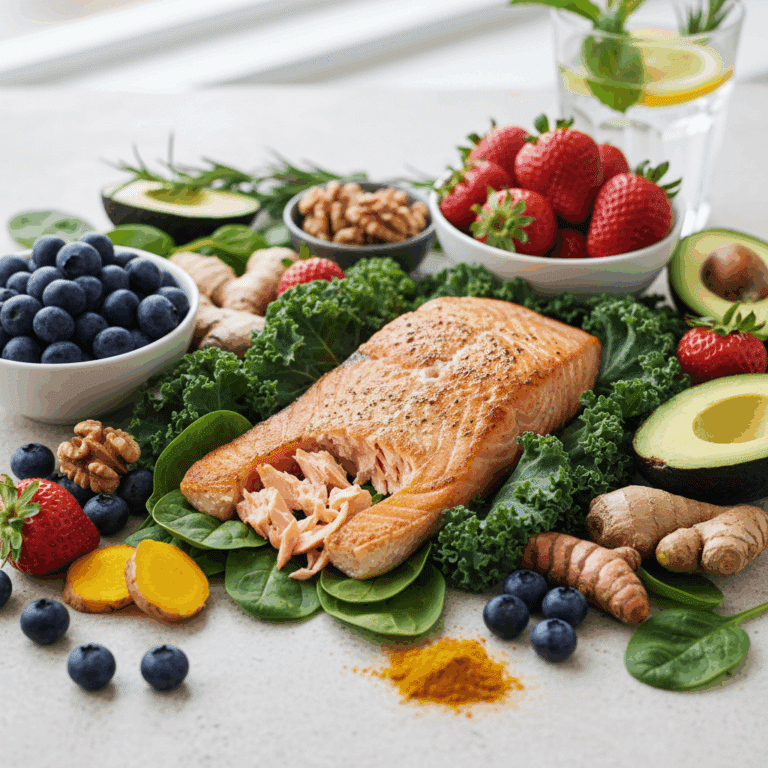Key Anti-Inflammatory Food Groups
The foundation of an anti-inflammatory diet lies in consuming nutrient-dense foods that help combat chronic inflammation. These foods not only protect your health but also improve skin, hair, and weight management.
Incorporating diverse groups such as colorful fruits, vegetables, fatty fish, and healthy fats can significantly reduce inflammation markers in the body. Their antioxidant and bioactive compounds play a vital role in this process.
Fruits and Vegetables Rich in Antioxidants
Fruits and vegetables provide powerful antioxidants and polyphenols essential for fighting inflammation. Berries like strawberries, blueberries, and blackberries are rich in anti-inflammatory compounds and fibers.
Cruciferous vegetables such as broccoli, kale, cauliflower, and cabbage offer additional benefits. They contain antioxidants that support immune modulation and help regulate inflammatory responses effectively.
These plant foods also supply vitamins and minerals that nourish the skin and promote overall cellular health, making them indispensable in any anti-inflammatory eating plan.
Fatty Fish and Healthy Fats
Fatty fish including salmon, sardines, mackerel, and anchovies are abundant sources of omega-3 fatty acids. These essential fats are known for their potent anti-inflammatory effects and cardiovascular benefits.
Healthy fats from extra virgin olive oil and avocados also contribute by reducing oxidative stress and inflammation. Olive oil contains antioxidants that help lower inflammation markers.
Additionally, nuts and seeds like walnuts, almonds, chia, and flaxseeds provide both healthy fats and micronutrients, supporting inflammation control and enhancing overall wellness.
Nutritional Benefits of Specific Anti-Inflammatory Foods
Specific anti-inflammatory foods provide targeted nutrients that profoundly support health by reducing inflammation. These foods include cruciferous vegetables, oleaginous seeds, nuts, oils, and powerful spices.
Incorporating these items daily can enhance antioxidant intake, improve immune response, and contribute to long-term protection against inflammation-related diseases and aging.
Cruciferous Vegetables and Their Effects
Cruciferous vegetables such as broccoli, kale, cauliflower, and cabbage are packed with antioxidants and bioactive compounds. These help regulate the body’s inflammatory pathways and support detoxification.
They contain sulforaphane, a potent compound known for reducing oxidative stress and inflammation, making them essential for maintaining cellular health and immune balance.
Regular consumption promotes a healthy gut microbiome and supports metabolic processes, contributing to better overall resilience against chronic inflammation.
Oleaginous Seeds, Nuts, and Oils
Seeds and nuts like walnuts, almonds, chia, and flaxseeds offer rich sources of omega-3 fatty acids and healthy fats critical in fighting inflammation. These fats help reduce inflammatory markers and improve cardiovascular health.
Extra virgin olive oil, loaded with monounsaturated fats and antioxidants, is especially effective in lowering systemic inflammation. Avocado also provides healthy fats and bioactive compounds that combat oxidative stress.
Incorporating these foods supports balanced lipid profiles and supplies essential micronutrients that bolster the immune system and inflammation control.
Spices and Their Anti-Inflammatory Compounds
Spices such as turmeric, ginger, garlic, and cinnamon contain natural anti-inflammatory compounds like curcumin and gingerol, which actively modulate inflammatory responses in the body.
These spices not only enhance flavor but also provide antioxidants that reduce oxidative damage, helping protect cells from chronic inflammation and related conditions.
Adding them regularly to meals can boost immune defenses and support overall well-being, making them valuable components of an anti-inflammatory diet.
Beverages and Whole Foods Supporting Inflammation Reduction
In addition to solid foods, certain beverages and whole foods are powerful allies in fighting chronic inflammation. Their rich content of antioxidants and polyphenols supports overall health.
Incorporating these drinks into a daily routine can enhance antioxidant intake, protect cells from damage, and reduce systemic inflammation efficiently.
Teas, Coffee, and Dark Chocolate
Green tea and herbal teas are abundant in polyphenols and catechins that combat inflammation and oxidative stress. They gently modulate immune functions, promoting overall wellness.
Coffee contains antioxidants that help reduce inflammatory markers, supporting cardiovascular health when consumed in moderation without excess sugar or cream.
Dark chocolate with a high cocoa content is rich in flavonoids that provide potent anti-inflammatory effects. It also supports vascular health and improves skin texture.
Health and Appearance Improvements from Anti-Inflammatory Diets
Adopting an anti-inflammatory diet significantly benefits health and appearance by reducing chronic inflammation. These foods help maintain vibrant skin, strong hair, and support healthy weight management.
The rich antioxidants and bioactive compounds in anti-inflammatory foods combat oxidative stress, enhance cellular repair, and contribute to overall vitality and youthful appearance.
Impact on Skin, Hair, and Weight Control
An anti-inflammatory diet nourishes skin and hair with essential nutrients, reducing visible signs of aging and promoting a radiant complexion. The antioxidants help neutralize free radicals that damage cells.
Fatty fish and colorful fruits provide omega-3s and vitamins that improve skin elasticity and hair strength. This dietary approach also supports healthy weight by managing inflammation-linked metabolic imbalances.
Fiber-rich vegetables and nuts aid digestion and regulate blood sugar, which helps prevent fat accumulation linked to chronic inflammation and obesity.
Protection Against Chronic Diseases and Aging
Chronic inflammation is a major driver of diseases like cardiovascular conditions, diabetes, and arthritis. Anti-inflammatory diets help lower inflammation markers, protecting against these illnesses.
Foods like cruciferous vegetables, nuts, and spices contain compounds that slow the aging process by reducing oxidative damage to tissues and promoting healthy immune responses.
Interesting Fact: Longevity and Inflammation
Studies show populations consuming anti-inflammatory diets, such as the Mediterranean diet, have longer lifespans and reduced incidence of chronic diseases due to their lower systemic inflammation levels.
Incorporating anti-inflammatory foods regularly is a powerful strategy for extending healthspan and maintaining functional independence with age.






